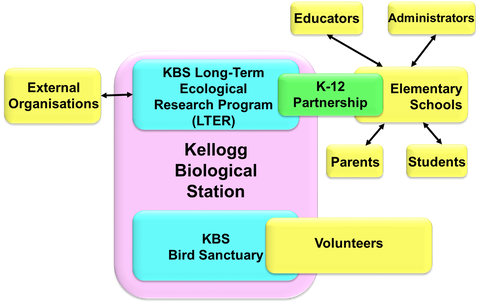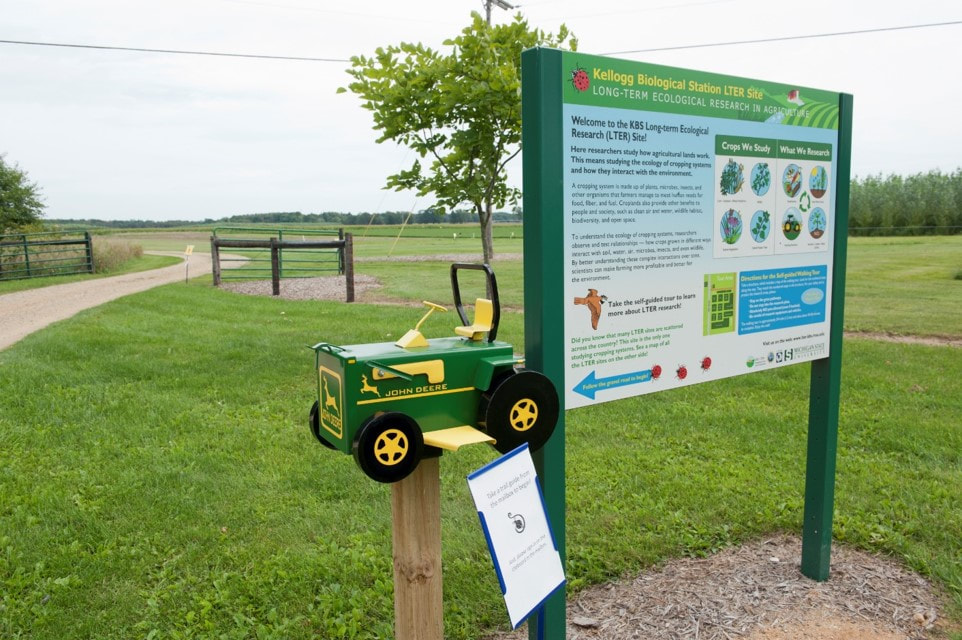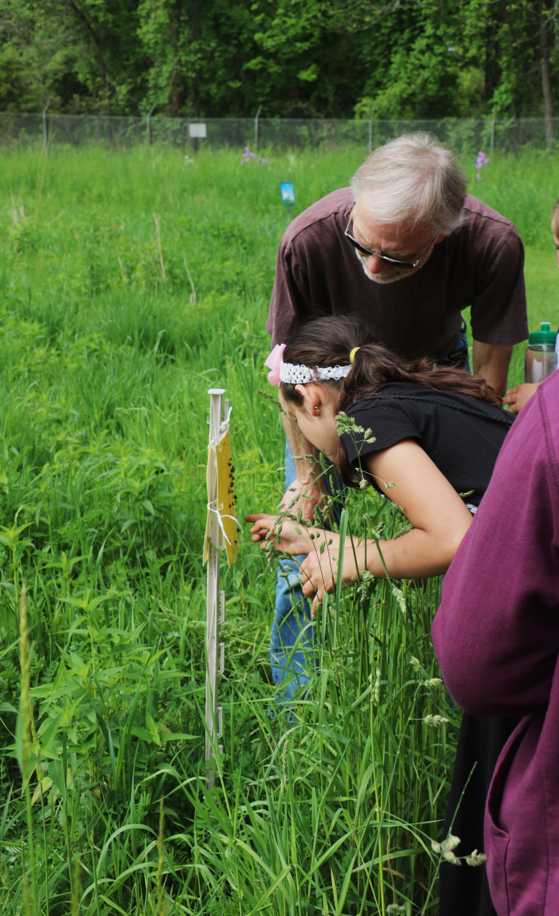Community partner diagram for my community engaged education project.
The colours indicate the affiliation of the partners:
Blue - University partners,
Yellow - community partners,
Green - existing program that has members from both, the community and the university.
Blue - University partners,
Yellow - community partners,
Green - existing program that has members from both, the community and the university.
University Partners:
|
THE W. K. KELLOGG BIOLOGICAL STATION (KBS):
The W.K. Kellogg Biological Station (KBS) is one of the most unique field stations. It is Michigan State University’s largest field station with over 3,800 acres of land which include diverse aquatic and terrestrial habitats and excellent research facilities supporting resident faculty, students and visiting researchers. THE KBS LONG-TERM ECOLOGICAL RESEARCH PROGRAM (LTER): In 1980, the National Science Foundation created the Long-term Ecological Research (LTER) Network in order to better understand ecosystems, especially the long-term effects of changes and perturbations, and develop strategies to protect them. KBS LTER scientists focus on agricultural ecosystems and are interested in reducing costs to both, farmers and the environment, by learning more about alternative methods that can help provide nutrients and pest protection required for high crop yields. |
Trail-head in Phase 1
Photo Credit: Julie Doll, KBS LTER, MSU |
THE W.K. KELLOGG BIRD SANCTUARY
The W.K. Kellogg Bird Sanctuary has offered a safe place for native birds to rest and breed and an outdoor classroom for MSU and the local community since 1927. The Sanctuary’s mission is to conserve native habitat for migratory and resident birds and through research, education, and outreach help people gain environmental awareness about our past, present and future.
The W.K. Kellogg Bird Sanctuary has offered a safe place for native birds to rest and breed and an outdoor classroom for MSU and the local community since 1927. The Sanctuary’s mission is to conserve native habitat for migratory and resident birds and through research, education, and outreach help people gain environmental awareness about our past, present and future.
Some of the Community Partners:
|
LOCAL VOLUNTEERS
Community partnerships between universities and the local population is very important when attempting to develop an inclusive curriculum. This is especially valuable if the community partners are given a say in the entire process including the design. One major method to involve the community is by developing a group of volunteers. Attempts at building such relationships at many field stations have noted that some of the most eager members to join such programs are retired university and K-12 teachers, and scientists. In the context of our project, this is actually a perfect demographic: Local citizens who have a deep understanding of the place they live in and a lifelong experience with science and pedagogy. LOCAL EDUCATORS: Involving teachers when designing curricular material, or field experiences is very important. They would be the best judge of the utility and relevance of the curriculum both in terms of their teaching and in terms of meeting existing education standards in their schools. Aligning activities with existing curriculum will also mean that teachers will be more willing to buy-in to the field experience and consider it to be a valuable use of their limited time and resources. LOCAL SCHOOL ADMINISTRATORS: One of the major barriers to students experiencing nature and going on field trips is the lack of financial resources. Some of the other issues that can affect students access to such experiences is school schedules, concerns about liability, access to parent volunteers and transportation costs. And although teachers might see the value of incorporating field experiences in their teaching, they are not able to make these decisions themselves. Most of these decisions are made by school administrators, and therefore including school administrators in the process is crucial. |
Local Volunteer leading activities on the trail
Photo Credit: Sabrina Brown, KBS LTER, MSU |
Existing Community-University Partnership:
THE KBS K-12 PARTNERSHIP:
The KBS K-12 Partnership program has existed since 1999. It aims to provide teachers in-depth exposure to research topics in environmental science, ecology, evolution, and conservation. It also aims to provide training to teach inquiry-based science at the elementary and secondary levels. The Partnership is a joint effort among KBS scientists, MSU College of Education faculty, science teachers and administrators in southwest Michigan school districts.
The KBS K-12 Partnership program has existed since 1999. It aims to provide teachers in-depth exposure to research topics in environmental science, ecology, evolution, and conservation. It also aims to provide training to teach inquiry-based science at the elementary and secondary levels. The Partnership is a joint effort among KBS scientists, MSU College of Education faculty, science teachers and administrators in southwest Michigan school districts.



